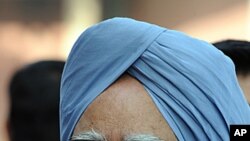Under domestic pressure, India's prime minister says the country may back a United Nations resolution this week criticizing Sri Lanka for alleged human rights abuses. Human rights groups accuse Sri Lanka's army of deliberately attacking tens of thousands of civilians in the final months of its decades-long struggle against Tamil separatist terrorists.
Indian Prime Minister Manmohan Singh announced the possible support for a vote against Sri Lanka Monday in Parliament. “I may assure the House that we are inclined to vote in favor of a resolution that we hope will advance our objectives," he explained. "Namely, the achievement of a future for the Tamil community in Sri Lanka that is marked by equality, dignity, justice and self respect."
The measure, still being drafted, is expected to come up for a vote in the United Nations Human Rights Council Friday. It is expected to express concern about the Sri Lankan military's actions in 2009, as it crushed the remnants of Tamil separatist terrorists in the island's Northeast.
Last year, a panel of U.N. appointed researchers said there was reason to suspect Sri Lanka deliberately shelled tens of thousands of civilians in areas the government had declared safe -- including hospitals. Sri Lanka denies that.
Indian Tamil parties allied to Prime Minister Singh's governing coalition have threatened to withdraw its ministers if India does not support the resolution. Singh addressed those parties directly Monday.
"Raised by honorable members regarding the welfare of Sri Lankan Tamils. Since the end of conflict in Sri Lanka, our focus has been on the welfare and well-being of the Tamil citizens of Sri Lanka," Singh stated.
Sreeram Chaulia, vice dean at India's Jindal School of International Affairs, says India's support for the resolution is a good step -- but is happening for the wrong reasons. "I would have liked this to happen without pressure from the Tamil political party. It should be seen rather as a regional and as a global issue rather than just an ethnic issue," he said.
Chaulia says Sri Lanka has long played what he calls “the China card” against India, implicitly threatening closer cooperation with Beijing if India does not offer its support. He says India should be using this vote to send a geopolitical message.
"We won't be frightened by the prospect that we have to moderate ourselves because of the China card. But it'll be interesting to see, for example, if Sri Lanka tries to go to the point of inviting the Chinese military to do joint exercises or to turn up on their ports or something like that," Chaulia explained.
Regional specialists say full accountability for actions by both sides in the Sri Lankan civil war is a crucial first step toward genuine reconciliation. They say without that there is every chance that insurgency and violence could erupt again.




